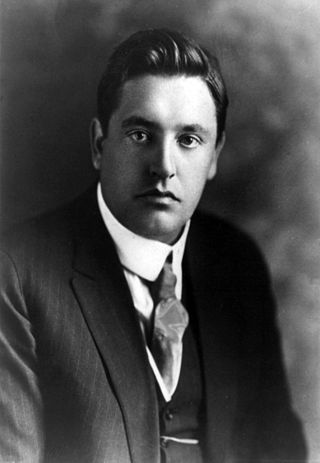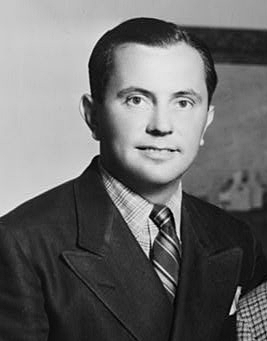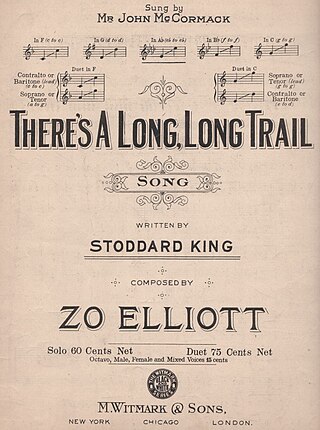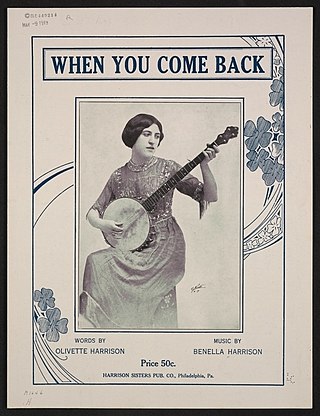Background
Harold Lake had been a great friend of Harry Dearth, the ballad singer, from when they had been in the choir school of Westminster Abbey together. Dearth had urged Lake to try to write lyrics, but it was not until some years after, that "I Hear You Calling Me" was written. Lake explained that behind the events which led up to its composition lay a story of youthful romance: [1]
A 16-year-old pupil teacher at an elementary school in Canterbury met a girl nearly a year his junior. Then followed three years of utter devotion as only the very young can know, then a fortnight of galloping consumption, and a lad of 19 standing on a November day grave.
Six years later, Lake woke up one morning and the words came to him; they were written in 20 minutes. [1] He was reported to have sold the song for a few pounds, but made a fortune from the sale of its gramophone recordings. [2]
Charles Marshall, born in Yorkshire, was an organist, professor of music and composer of songs, church music and chamber music. [3] He visited the tenor John McCormack at his lodgings and played him his setting of the lyrics. McCormack started to sing it, and soon became enthusiastic. He suggested that they should visit Mr. Arthur Boosey as he would be sure to publish it. [4]
The song became a bestseller for McCormack and helped to start him on the road to success. [1] He recorded it six times in total, twice for Odeon and four times for Victor. [5] The song became so closely identified with him that his wife Lily adopted it as the title of her biography of him. [4] [6]

Count John Francis McCormack, was an Irish lyric tenor celebrated for his performances of the operatic and popular song repertoires, and renowned for his diction and breath control. He was also a Papal Count. McCormack became a naturalised American citizen before returning to live in Ireland.

"This Land Is Your Land" is a song by American folk singer Woody Guthrie. One of the United States' most famous folk songs, its lyrics were written in 1940 in critical response to Irving Berlin's "God Bless America". Its melody is based on a Carter Family tune called "When the World's on Fire". When Guthrie was tired of hearing Kate Smith sing "God Bless America" on the radio in the late 1930s, he sarcastically called his song "God Blessed America for Me" before renaming it "This Land Is Your Land".
"She Moved Through the Fair" is a traditional Irish folk song, with a number of iterations, that has been performed and recorded by various artists. The narrator sees his lover move away from him through the fair, after telling him that since her family will approve, "it will not be long [love] 'til our wedding day". She returns as a ghost at night, and repeats the words again, intimating her own tragic death and the couple's potential reunion in the afterlife. There are numerous alternate versions, some sung about a male lover, with different lyrics, such as "Our Wedding Day" and "My Young Love Said to Me", among others.

"When Irish Eyes Are Smiling" is a lighthearted song in tribute to Ireland. Its lyrics were written by Chauncey Olcott and George Graff, Jr., set to music composed by Ernest Ball, for Olcott's production of The Isle O' Dreams, and Olcott sang the song in the show. It was first published in 1912, at a time when songs in tribute to a romanticised Ireland were very numerous and popular both in Britain and the United States. During the First World War the famous tenor John McCormack recorded the song.

Vernon Duke was a Russian-born American composer and songwriter who also wrote under his birth name, Vladimir Dukelsky. He is best known for "Taking a Chance on Love," with lyrics by Ted Fetter and John Latouche (1940), "I Can't Get Started," with lyrics by Ira Gershwin (1936), "April in Paris," with lyrics by E. Y. ("Yip") Harburg (1932), and "What Is There To Say," for the Ziegfeld Follies of 1934, also with Harburg. He wrote the words and music for "Autumn in New York" (1934) for the revue Thumbs Up! In his book, American Popular Song, The Great Innovators 1900-1950, composer Alec Wilder praises this song, writing, “The verse may be the most ambitious I’ve ever seen." Duke also collaborated with lyricists Johnny Mercer, Ogden Nash, and Sammy Cahn.

"Danny Boy" is a song with lyrics written by English lawyer Frederic Weatherly in 1910, and set to the traditional Irish melody of "Londonderry Air" in 1913.
"Streets of Laredo", also known as "The Dying Cowboy", is a famous American cowboy ballad in which a dying ranger tells his story to another cowboy. Members of the Western Writers of America chose it as one of the Top 100 Western songs of all time.

"Das Glühwürmchen", known in English as "The Glow-Worm", is a song from Paul Lincke's 1902 operetta Lysistrata, with German lyrics by Heinz Bolten-Backers. In the operetta, it is performed as a trio with three female solo voices singing alternately and the women's chorus joining in the refrain. Rhythmically, it is in the form of a gavotte. The song, with its familiar chorus, was translated into English and became an American popular song.

"There's a Long, Long Trail" is a popular song of World War I. The lyrics were by Stoddard King (1889–1933) and the music by Alonzo "Zo" Elliott, both seniors at Yale. It was published in London in 1914, but a December 1913 copyright for the music is claimed by Zo Elliott.
Mary Hannah (May) Brahe was an Australian composer, best known for her songs and ballads. Her most famous song by far is "Bless This House", recorded by John McCormack, Beniamino Gigli, Lesley Garrett and Bryn Terfel. According to Move.com.au: "She was the only Australian woman composer to win local an international recognition before World War II," having "290 of her 500 songs published. Of these, 248 were written under her own name, the remainder under aliases.
Charlotte Alington Pye Barnard was an English poet and composer of ballads and hymns, who often wrote under the pseudonym Claribel. She wrote over 100 songs as well as two volumes of verse, and became the most commercially successful balled composer managed by her publishers Boosey's, with whom she established one of the first royalty arrangements.
"Oh Johnny, Oh Johnny, Oh!" is a song composed by Abe Olman (1887–1984), lyricized by Ed Rose, and published by Forster Music Publisher, Inc. The music was copyrighted 7 February 1917 and the copyright was renewed 29 December 1944. Under the Copyright Term Extension Act (1998), the sheet music is in the public domain, as is all music published in the U.S. prior to 1923. Its melody and structure form the basis of a self-calling circle dance, using square dance steps and popular in summer camps.

"The Sunshine of Your Smile" is a British popular song published in London in 1913 just before the First World War by Francis, Day and Hunter. The lyrics were by Leonard Cooke and the music by Lilian Ray. It became a top ten hit on the UK Singles Chart in 1980, sung by Mike Berry.

"Calling Me Home To You" is an American song written by Edward Teschemacher and composed by Francis Dorel. The song was first recorded on May 31, 1916, by Alfred De Manby, a baritone vocalist, for Columbia Records.

"When My Ships Come Sailing Home" is an American song composed by Francis Dorel and lyrics by Reginald Stewart. The sheet music for the song was distributed as early as 1913 by Boosey & Co, one of the forerunners of the Boosey & Hawkes publishing firm.

"When You Come Back" is a World War I song released in 1919.

"Somewhere a Voice Is Calling" is a World War I song originally released in 1911. Arthur F. Tate composed the song and Eileen Newton wrote the lyrics. The song was published by T. B. Harms & Francis, Day & Hunter, Inc. in New York City.

"The Ragtime Soldier Man" is a World War I era song released in 1912 and 1917. Irving Berlin wrote the lyrics and composed the music, basing it off his 1911 song "Alexander's Ragtime Band". The song was published by Waterson, Berlin & Snyder, Co. of New York, New York. Artist Pfeiffer designed the sheet music cover. It features a U.S. soldier holding his rifle and jumping over cannon balls. The song was written for voice and piano.
This is a summary of 1908 in music in the United Kingdom.
"My Greatest Mistake" is a popular song written in 1940 by Jack Fulton and Jack "Bones" O'Brien.














